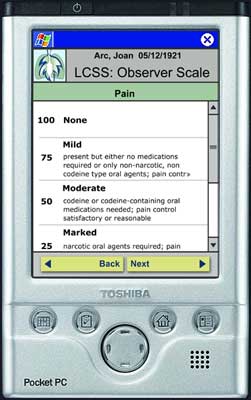
|
> Technical Notice for LCSS-QL Take a Virtual Tour of the Electronic LCSS-QL (Adobe Document 1.2MB)
· The LCSS has been programmed into the Windows-based PDA operating system devices (thus, hand helds that are not Palm-based). The reason for the choice of the Pocket PC was that the operating system is more powerful and is more easily adapted for such custom programming. · This system eliminates several practical impediments to efficient assessment of quality of life: 1) the location of various paper instruments; 2) the measuring of score ratings; 3) the transcription of data, with the potential of measurement error, such as transposing numbers; 4) the difficulty of displaying of quality of life information over time; 5) the collation of data for analysis; and 6) the maintenance of patient confidentiality (with use of passwording). · An operations manual has also been prepared to help with installation and administration. Background: · The Lung Cancer Symptom Scale (LCSS) is a site-specific (site of the primary cancer) health-related quality of life (HRQL) questionnaire for individuals with lung cancer. The LCSS was designed as a written measure for use in clinical therapeutic trials and in clinical practice for patients with lung cancer undergoing treatment. The philosophy behind the development of the LCSS was to provide a practical measure that would reduce patient and staff burden in repeated measurement of HRQL during the course of a trial or during treatment, and would concentrate in detail on those aspects of quality of life most likely to be affected by treatment interventions. · The LCSS (paper format) has been used for over 15 years in many countries and on six continents. It was evaluated for feasibility, reliability, and validity in nearly 1,000 lung cancer patients at eight cancer centers in the U.S. and Canada. The outcomes were quite favorable, and results have been published in several peer-reviewed journals, such as Cancer, European Journal of Cancer, Lung Cancer, and Supportive Care in Cancer. · At a recent conference in Naples, Italy (December 2002), the consensus was that HRQL assessment needs to be more feasible, with better patient completion rates and less measurement error. Although the completion rate for the brief 9-item patient LCSS has been good, there is the potential for measurement error with use of the hand scored visual analogue scales. Contact Information: |

